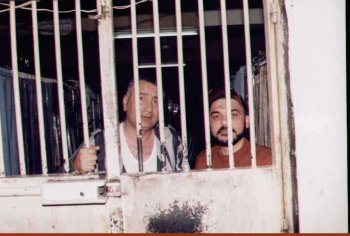By Polly Johnson
Impunity Watch Reporter, Middle East
![Protesters joined Shalits parents to press for his release. [Photo Courtesy of The Observer.]](http://static.guim.co.uk/sys-images/Observer/Pix/pictures/2010/6/25/1277497867842/Israeli-activists-call-fo-006.jpg)
JERUSALEM, Israel – The parents of Staff Sgt. Gilad Shalit, an Israeli soldier who has been held captive in Gaza for the past four years, began a twelve-day march on Sunday from their home to Jerusalem, where they plan to camp out in front of Israeli Prime Minister Benjamin Netanyahu’s official residence until the Israeli government wins Shalit’s release.
“We won’t wait any longer in our home,” said Noam Shalit, Gilad’s father, at the start of the march, which drew approximately two thousand supporters, including dozens of local celebrities. Hundreds of the supporters waved Israeli flags and carried signs, many of which read, “Gilad Shalit, we’re waiting at home for you.”
Shalit was captured in a cross-border dispute in June 2006 by Palestinian militants, and has been held in Gaza by Hamas militants who are demanding the release of as many as one thousand Palestinian prisoners in exchange for Shalit’s release. Several prisoner swap deals between Israel and Hamas have failed in the past.
An Israeli poll indicated that seventy-five percent of Israelis would support the release of Palestinian prisoners, some of them convicted killers, in exchange for Shalit’s release.
Shalit has not been allowed any contact with the outside world nor with the International Red Cross. Apart from one audio tape and a video tape released by Hamas in October 2009 as a proof of life, the details of Shalit’s physical condition remain unknown. He was nineteen years old when he was captured.
Palestinians and Israelis alike are vested in the prospect of a prisoner exchange. Many Palestinians have relatives who are currently jailed in Israeli prisons. And in Israel, where military service is compulsory for most Jews and where most people have a family member or relative who serves in the military, the fate of Shalit resonates deeply.
Israel’s restriction of goods into and out of Gaza began shortly after Shalit’s capture in 2006 in an effort to pressure Hamas to release him. Later, a full blockade was imposed, but was eased after the recent deadly Israeli raid on the aid flotilla. The Shalits fear that the easing of the blockade has shown that the government is abandoning their son.
Negotiations for Shalit’s release have occurred through German and Egyptian mediators, since Israel does not deal directly with Hamas, considered by Israel to be a terrorist organization.
For now, Noam and Aviva Shalit will wait. “We don’t see any alternative after four years of government failure to obtain the release of my son,” Noam told England’s Observer, adding, “there have been many, many failures, but it’s time to put public pressure on the government.”
For more information, please see:
Al Jazeera – Israeli soldier’s family urges swap – 27 June 2010
BBC – Captive Israeli soldier Shalit’s parents begin march – 27 June 2010
CNN – Captured Israeli soldier’s family marches to bring about release – 27 June 2010
Los Angeles Times – Family of captured Israeli soldier launches march to Jerusalem to press for his release – 27 June 2010
Observer – Israeli protesters press Binyamin Netanyahu to help free abducted soldier Gilad Shalit – 27 June 2010
New York Times – Family of Captured Israeli Soldier Press for Deal – 27 June 2010



